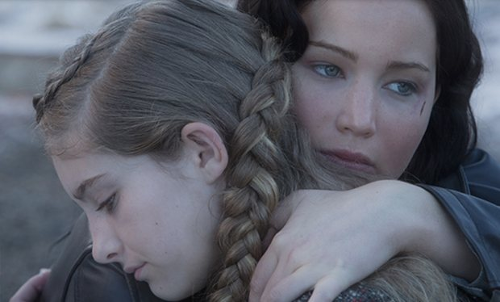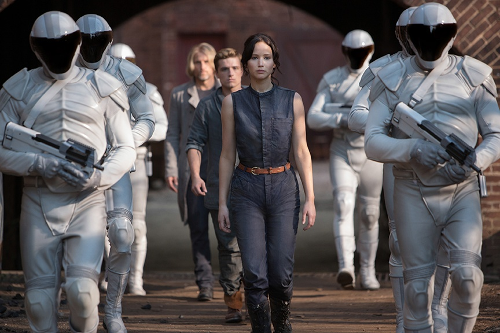In an inverse of the source material, Catching Fire is a much stronger movie than The Hunger Games. It looks better, the acting is stronger, and the trickiest story elements—including the Katniss-Peeta-Gale love triangle—are handled more gracefully. If you liked the books or the first film, go see Catching Fire immediately. Then come back and read this review, because I’m about to go on a spoiler spree.

Katniss: We know she’s an Action Hero because her family is in danger.
Katniss got into this situation through desire to protect her family: in the first book/film she volunteers to go to the Hunger Games in her sister Prim’s place. But as a survivor of the 74th Hunger Games and potential symbol of a revolution, every move Katniss makes is monitored by the Capitol. And she’s stubborn enough that she would rather defy their control and be killed. Until she’s reminded they can also hurt her family: her mother, her sister, her best friend/would-be lover Gale, and even her “management team” for her role as tribute/victor.
It’s protecting these people that stops Katniss from running into the woods and away from her Important Role and Grave Duties. Using family in danger as motivator for heroes is a well-worn trope. Male heroes often “nobly” walk away form their love (see Peter Parker and his love interests in both 21st century film adaptations of Spider-Man) or lose them and are then motivated by their death (see Peter Parker and oh, every other hero ever).
Too often female action heroes are a) not motivated at all, because they’re just “Fighting fuck toys” b) motivated only by their own survival, becoming heroes only by failing to become victims. So trite as it may be, seeing Katniss as the cliched tortured protector of her loved ones was satisfying for me.
BUT EVERYONE ELSE MUST PROTECT KATNISS!

While Katniss is busy trying to keep her loved ones alive, everyone else (with the exception of President Snow and the other sinister Capitol forces who want her dead) is focused on keeping her alive. Peeta volunteers for the Quarter Quell games to keep Katniss alive, even though that means his certain death. Haymitch and Effie both conspire behind the scenes to help Peeta keep Katniss alive, even though Haymitch promises to focus his efforts on saving Peeta. And then they’re all the people who don’t even know Katniss who are fixated on her survival because of her value to the rebellion in Panem: she’s their Mockingjay, a symbol of hope that the Captiol is not all-powerful. After the climax we learn that half the tributes (including the brash Johanna Mason and the sex symbol Finnick O’Dair) allied with Katniss and Peeta with the express goal of getting her out of the arena alive. Even the Head Gamemaker is a secret agent for the rebellion, which only makes sense if you want it to.
Everyone wants Katniss alive and she almost ends up dead around 30 times this movie. Even though she’s a badass who can shoot anything at any speed from any angle (and apparently generate arrows in her quiver through sheer willpower). I realize the Hunger Games arena—and the dystopia of Panem more generally—are horrifying deathscapes that kill plenty of badasses, but it’s frustrating that Katniss’s proven survival abilities are more or less dismissed by her many protectors. Meanwhile Peeta, who’s showcase survival skill is CAKE DECORATING, is pretty much left on his own and at one point better trusted to protect vital engineer Beetee (although that might be a ruse to actually protect Katniss? I’m confused on that point but either way, sheesh).
While Katniss is loveable and Important for the World, it does get a little tiresome having every person around her either trying to kill her or trying to save her. It takes away from the individual agency that makes the character so satisfying and iconic for us in the first place.
But this isn’t enough to take Catching Fire down. Katniss is still a great character and Jennifer Lawrence is even better than usual (which is saying something) in this role. The story is still fascinating and this installment of the film series is absolutely captivating. It would be wonderful if the next film continues this trend of improvement, and the bizarre network of protect-and-be-protected relationships in Panem is handled more delicately (and knowing where the story goes, I’m hopeful).
She simultaneously inspires danger and protection because her life is of great consequence in the greater scheme of war. I don’t see it as antifeminist. Harry Potter was in the same position.